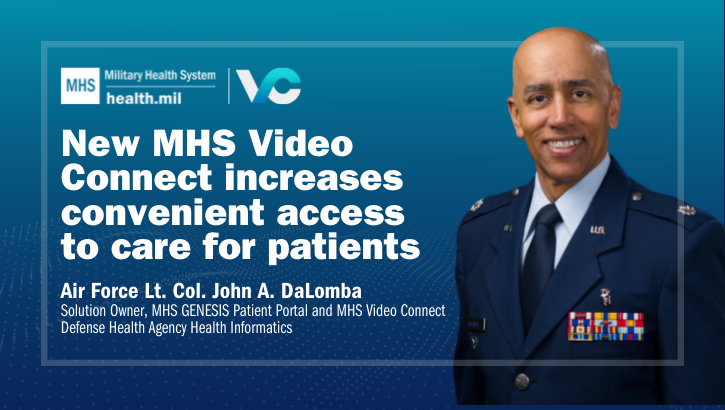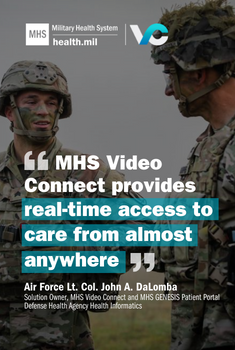New MHS Video Connect increases convenient access to care for patients
 Air Force Lt. Col. John A. DaLomba discusses the new MHS Video Connect and what it means for the MHS. (Photo by: Connected Health)
Air Force Lt. Col. John A. DaLomba discusses the new MHS Video Connect and what it means for the MHS. (Photo by: Connected Health)
The following article is a first-person account by Air Force Lt. Col. John A. DaLomba, MHS GENESIS Patient Portal and MHS Video Connect solution owner at the Defense Health Agency Health Informatics Branch.
Patient empowerment and active engagement are paramount to improve health care.
The Military Health System's new MHS Video Connect allows patients to meet with their military health provider virtually through live video on any internet-connected device.
MHS Video Connect is an important step forward in providing virtual health capabilities that improve health outcomes and support military readiness. It's convenient, it's secure, and it's easy to use.
Most patients already have the devices to connect with their provider or care team and receive the care they need – without leaving their home or office. This makes virtual appointments easy to schedule and conduct. Additionally, MHS Video Connect helps reduce the time and costs related to medical treatment and travel while improving the efficiency and effectiveness of virtual health.
Open to all active-duty service members, their families, and retirees enrolled in a military medical treatment facility (MTF), this new web-based virtual health platform provides real-time access to care from almost anywhere and works with existing MHS medical processes and electronic health records. All continental United States-based hospitals and clinics expected to have this capability by the end of 2021.
Convenient and Secure
Making an appointment in MHS Video Connect is simple.
Patients can use the tools they currently use contact their assigned MTF's scheduling office or, depending on their facility, do it themselves online. Providers and their staffs must schedule the appointment through the Video Care Manager module of MHS Video Connect as well.
 "MHS Video Connect provides real-time access to care from almost anywhere." (Photo by Connected Health)
"MHS Video Connect provides real-time access to care from almost anywhere." (Photo by Connected Health)
By clicking a link in a confirmation email that is sent the day the appointment was scheduled, patients can meet with their provider and care team in a secure private video treatment room unique to each appointment. Both patients and providers can add up to five guests to their appointments. This enables family members, loved ones, and medical specialists to be directly involved in supporting the patient and their treatment plan, all through a high-quality video connection.
In the Department of Defense, we have to balance convenience and ease of use with cybersecurity, which is essential to protecting our nation and those who serve it. MHS Video Connect is designed specifically for secure communications for military health care, as opposed to commercial teleconferencing or video teleconferencing platforms made for more general use.
The platform is a modified version of the Department of Veterans Affairs' video virtual health solution - VA Video Connect. We have incorporated additional cybersecurity features and vetting so patients and providers can feel confident that all personal health information transmitted through the system is secure.
Looking Forward
Development of MHS Video Connect began in the fall of 2020 and in March 2021 initial testing took place at nine locations in the continental U.S. and Alaska.
Recently, limited field evaluations have happened at three locations in Europe, one in Japan, and one in South Korea. All results have been promising and while there are some things we need to work on, we are looking forward to deploying MHS Video Connect overseas sooner than later.
Ultimately, the plan is to deploy MHS Video Connect in locations that may not have a provider or dedicated medical team. The goal is to provide care wherever patients are located, in both operational and garrison settings.
Our deployment team receives feedback from the sites using MHS Video Connect, and we optimize the system regularly based on it. We are constantly examining how we can improve MHS Video Connect to better meet patient and provider needs. For example, we identified that the clinical area that uses video virtual health the most is behavioral health, which frequently uses group appointments in treatment. Moving forward, we plan to continue upgrading MHS Video Connect with the capability to host larger group appointments.
Proactive partnerships with our patients and providers are essential for preparing for the next one to five years, when more health care is likely going to be delivered virtually. Many patients won't need to go to an actual building to receive every level of care unless a provider needs to physically examine them, retrieve samples for a lab, or perform some sort of imaging.
The Military Health System is planning for that future to help ensure it meets patients where they are and delivers world-class care as effectively as possible.